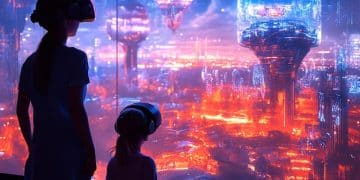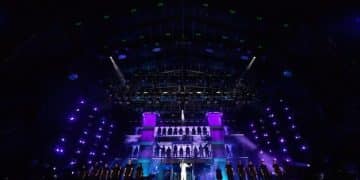Music Industry Shakeup: AI-Generated Music in 2025
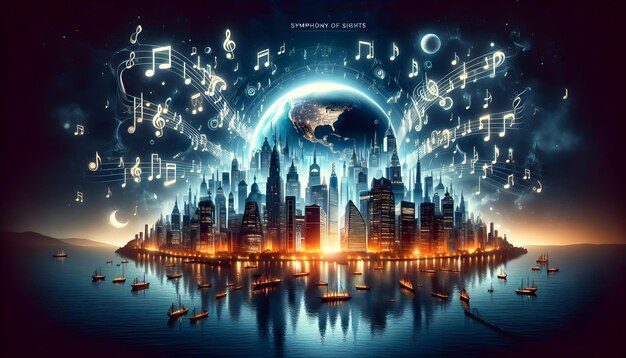
Music Industry Shakeup: How AI-Generated Music is Changing the Game in 2025 explores the transformative impact of artificial intelligence on music creation, distribution, and consumption, projecting significant changes by 2025.
The music industry is on the cusp of a significant transformation. Get ready for a music industry shakeup: how AI-generated music is changing the game in 2025. What does the future hold for artists, labels, and listeners in this new era of AI-driven creativity?
As artificial intelligence becomes increasingly sophisticated, its influence on music production is growing exponentially. This article delves into the ways AI is already revolutionizing the music industry and what we can expect in the coming years regarding a music industry shakeup: how AI-generated music is changing the game in 2025.
The Rise of AI Music Composition
AI’s capabilities have expanded beyond simple automation, now venturing into creative domains like music composition. Understanding the current state and potential future of AI in music reveals exciting possibilities.
AI Tools for Music Creation
Several AI-powered tools are now available that assist musicians and even allow non-musicians to create original compositions, heralding the beginning of a music industry shakeup: how AI-generated music is changing the game in 2025.
- Amper Music: Empowers users to create custom music for various media projects.
- Jukebox (OpenAI): Generates original music with lyrics in a variety of styles.
- AIVA: An AI composer that creates emotive soundtracks for films, games, and advertising.
These tools are not just novelties; they represent a shift towards democratizing music creation, making it accessible to anyone with a story to tell. Will this also make anyone able to succeed in the industry, and if that happens, what would a music industry shakeup: how AI-generated music is changing the game in 2025 look like?
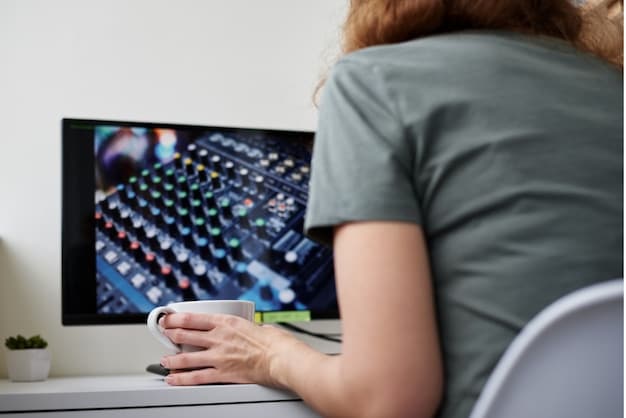
Impact on Traditional Music Production
The integration of AI into music production workflows is changing how music is created, produced, and distributed, impacting artists and industry professionals alike.
Changing Roles of Musicians
AI is not intended to replace musicians but rather to augment their abilities and streamline the creative process, though the music industry shakeup: how AI-generated music is changing the game in 2025 could see fewer instrumentalists employed.
- AI as a collaborator: Musicians can use AI to generate ideas, experiment with new sounds, and overcome creative blocks.
- Efficiency gains: AI can automate repetitive tasks, such as mixing and mastering, freeing up musicians to focus on songwriting and performance.
- Accessibility: AI tools can provide aspiring musicians with the resources they need to create high-quality music, regardless of their technical skills or financial resources.
The impact of AI on traditional music production is multifaceted and promises a future where technology and human creativity work hand in hand. This represents a significant music industry shakeup: how AI-generated music is changing the game in 2025.
AI-Driven Music Distribution and Marketing
AI is also transforming how music is distributed, marketed, and consumed, presenting exciting opportunities for artists to reach new audiences and monetize their work. How could the music industry shakeup: how AI-generated music is changing the game in 2025 look in sales?
Personalized Music Experiences
AI algorithms are used to analyze listener preferences and recommend music tailored to their individual tastes. This is creating more personalized music experiences and helping artists connect with fans on a deeper level.
- Algorithmic playlists: Streaming platforms like Spotify and Apple Music use AI to curate playlists that cater to individual listeners.
- Targeted advertising: AI-powered advertising platforms can target specific demographics and interests, ensuring that music reaches the right audience.
- AI-driven social media marketing: AI tools can automate social media posts, track campaign performance, and identify trending topics.
AI-driven music distribution and marketing hold immense potential for artists to expand their reach, engage with fans, and generate revenue in an increasingly competitive landscape. This is an important part of any music industry shakeup: how AI-generated music is changing the game in 2025 discourse.
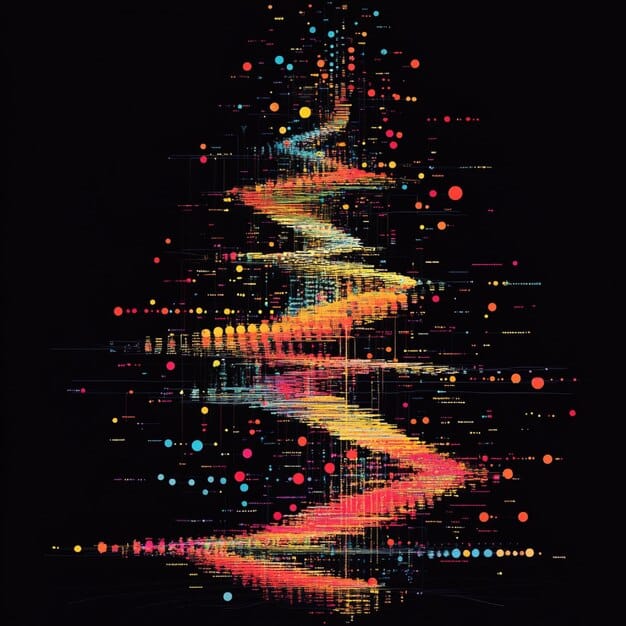
Ethical and Legal Considerations
The rise of AI-generated music also raises important ethical and legal questions around copyright, ownership, and artistic integrity. No music industry shakeup: how AI-generated music is changing the game in 2025 would be complete without these discussions.
Copyright and Ownership
Determining the copyright ownership of AI-generated music is a complex issue. Is it the AI developer, the user who prompts the AI, or the AI itself? The legal system is still grappling with these questions.
- Fair use: Can AI-generated music be considered fair use if it is based on existing works?
- Originality: Does AI-generated music meet the threshold of originality required for copyright protection?
- Attribution: How should artists be credited when AI is used in the music creation process?
Addressing these ethical and legal considerations is crucial for ensuring that AI is used responsibly and that artists are protected in the age of AI-generated music. We will need more legal precedence if any real music industry shakeup: how AI-generated music is changing the game in 2025.
The Future of AI in Music: 2025 and Beyond
Looking ahead to 2025, it’s clear that AI will play an even more significant role in the music industry as AI technologies become more sophisticated and integrated into every aspect of music creation, distribution, and consumption. The question is what the music industry shakeup: how AI-generated music is changing the game in 2025 might look like.
Predictions for 2025
Predicting the future is always challenging, but here are some potential developments we might see in the music industry by 2025:
- AI-powered virtual artists: AI could be used to create virtual artists with unique personalities, voices, and visual identities.
- AI-generated live performances: AI could power immersive live performances, where music and visuals are generated in real-time based on audience interaction.
- Hyper-personalized music: AI could create music tailored to individual listeners’ emotions, moods, and activities.
The future of AI in music is full of possibilities. As AI continues to evolve and improve, what will the world think of the music industry shakeup: how AI-generated music is changing the game in 2025?
Navigating the AI Revolution in Music
The integration of AI into the music industry presents both challenges and opportunities. Artists, labels, and listeners must adapt to this new landscape to thrive in the coming years.
Embracing AI as a Tool
Instead of viewing AI as a threat, musicians can embrace it as a powerful tool to enhance their creativity, increase their efficiency, and connect with new audiences. A music industry shakeup: how AI-generated music is changing the game in 2025 might be scary, but artists must embrace new technology to stay relevant.
- Experiment with AI tools: Explore different AI-powered music creation platforms and find ways to incorporate them into your workflow.
- Learn new skills: Develop skills in data analysis, machine learning, and AI ethics to stay ahead of the curve.
- Collaborate with AI developers: Partner with AI experts to create new and innovative music experiences.
By embracing AI as a tool, the music industry can unlock new levels of creativity, efficiency, and accessibility, while addressing the challenges and opportunities that come with this technological revolution. Many artists are eager to learn about the music industry shakeup: how AI-generated music is changing the game in 2025 to position themselves to take advantages of new tools and markets.
| Key Point | Brief Description |
|---|---|
| 🎵 AI Music Creation | AI tools are democratizing music creation, making it accessible. |
| 📈 AI Marketing | AI personalizes music experiences and target ads effectively. |
| ⚖️ Legal Issues | Copyright and ownership of AI music need legal clarity. |
| 🔮 Future Trends | AI could create virtual artists and hyper-personalized music. |
Frequently Asked Questions
AI is used in music production for tasks like automated mixing and mastering, generating melodies, and creating personalized playlists, changing the landscape of the music production. All of these things contribute to the music industry shakeup.
Popular AI music creation tools include Amper Music, Jukebox (OpenAI), and AIVA, which allow users to generate original compositions in various styles. They streamline the process of making music, and even let non-musicians write songs.
AI is more likely to augment the abilities of human musicians rather than replace them entirely. AI can assist with repetitive tasks and help generate new ideas, and it will be interesting to see what the music industry shakeup: how AI-generated music is changing the game in 2025 will be.
Ethical concerns include copyright and ownership issues, as well as questions about artistic integrity and originality. It is important to have legal discussions regarding how to deal with AI in the music industry.
Artists can prepare by embracing AI tools, learning new skills, and collaborating with AI developers to explore new creative possibilities. It is crucial that artists learn about the potential music industry shakeup: how AI-generated music is changing the game in 2025 so they can adequately adapt.
Conclusion
The music industry shakeup: how AI-generated music is changing the game in 2025 is already well underway. As AI continues to advance, expect even more disruption and innovation in the music industry. The key to success will be adapting to this shifting landscape.
By embracing AI as a tool, addressing ethical concerns, and fostering collaboration between humans and machines, the music industry can unlock new levels of creativity and accessibility. The future of music is sure to be interesting.

